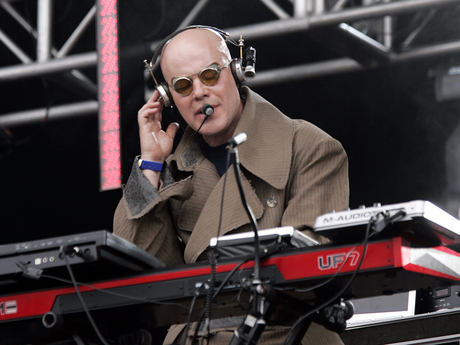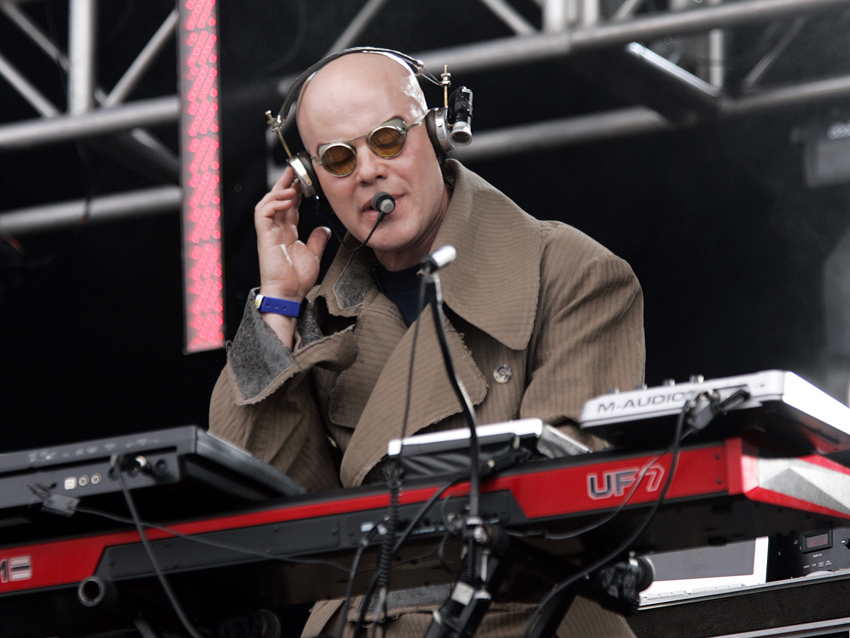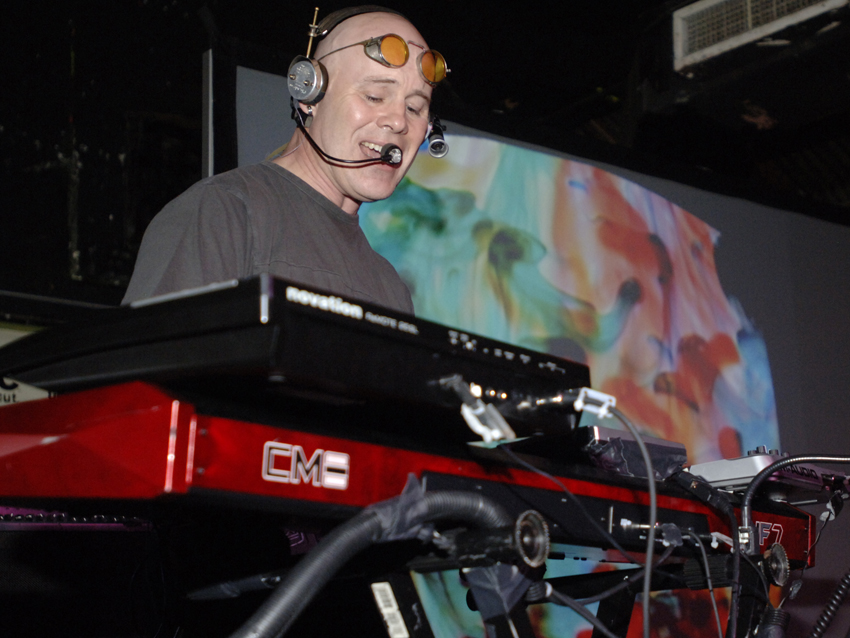
Want all the hottest music and gear news, reviews, deals, features and more, direct to your inbox? Sign up here.
You are now subscribed
Your newsletter sign-up was successful

Thomas Dolby (pictured on stage in 2006) is in peak form on his new album, A Map Of The Floating City. © Leon Neal/Reuters/Corbis
People might naturally assume that Thomas Dolby - the man who once yelled "Science!" at us back in the New Wave days of the early '80s - is still grooving to all things electronic. But on his luminous new album (his first release in nearly 20 years), A Map Of The Floating City, he draws upon a wide range of influences, artists who wouldn't know a synthesizer from a garden hoe.
"It's everybody from Dolly Parton to Dan Hicks," Dolby says. "And some Louis Armstrong, too. I'm just re-exporting American music the same way that Eric Clapton and Led Zeppelin and The Rolling Stones have done. It's something the British do very well."
On A Map Of The Floating City, which Dolby recorded in a renewable energy-powered studio he built aboard a 1930s lifeboat in the garden of his beach house in England, the synth pioneer gets downright rootsy on tracks like The Toad Lickers and 17 Hills (the latter of which features Mark Knopfler). "I never tire of the sound of a great guitar played by a great guitarist" he says. "That's something a keyboard will never truly deliver."
Elsewhere on the record, which is divided into three parts - Amerikana, reflecting his affection for the US; Urbanoia, a murky and disorienting ride; and Oceanea, a fairytale-like finale which takes us to a windswept paradise - Dolby explores lush, more expansive musical areas.
MusicRadar sat down with Dolby recently to talk about his remarkable new album. In addition, we discussed recording on a lifeboat, synth technology, his online game, essential pieces of gear and what it's like to rock out with a crazy wig.
You haven't put out any new music for almost 20 years. What have you been up to?
Want all the hottest music and gear news, reviews, deals, features and more, direct to your inbox? Sign up here.
"After the first 10 years or so in the music business, I was getting a bit disillusioned. During that time, I was working with hardware and software companies that made my instruments. So I decided, during the early '90s, to go to Silicone Valley and get involved with the new technologies.
"Initially, I was able to get a grant from Paul Allen's company to invent music software. From there, I formed my own company, which became Beatnik. Through the whole dot.com era, Beatnik grew without actually making any money. [laughs]
"We probably would have gone up in smoke if it weren't for the fact that we created the world's most-compact synthesizer. The world's largest mobile phone company came along and licensed it to do the sound in their phones. It saved them some money. We made the Beatnik synthesizer small so it would download instantly on a web page, and it was lightweight so they could get it to run in their low-end, mass-market phones."
So whenever we hear an annoying ringtone on the bus, we can blame you?
"No, you can't really blame me for the content. If it wasn't us, somebody else would've done it."
But tell us the truth, do you have your phone set to vibrate?
[laughs] "I do. But I am getting nostalgic for those early, polyphonic ringtones. Personally, I can't stand those little snippets of pop songs that go off at all the wrong times."
Let's get into the new album. Recording it in a solar-powered studio on a lifeboat - what, you couldn't afford a real studio?
[laughs] "Well, see, the thing is, I live on the East Coast of England, which is steadily sinking into the sea. I have a lifeboat so that my family and I can rise up above the floodwaters and sail off into the sunset.
"After retiring from Beatnik and moving back to England, I built a studio in the boat. It took a lot of doing - I had to get boat builders involved. But I was able to find a reusable energy company to work with me; we replaced the standard motors with a bank of batteries, installed a 450-watt turbine up the mast and put solar panels on the deck of the cabin, and that gives me enough power to work late into the night.
"It's a great studio. I don't have the traditional drum room and piano room like the big places, but I have enough room to get things done. If I have another musician with me, I put him in the saloon while I'm in the wheelhouse. For horn sections and things like that, I have to move to a larger studio, though."
Your singing on the record is superb. Do you feel as though you don't get enough credit as a singer?
"Oh, well, thank you. I think I'm recognized for my singing as much as I need to be. [laughs] I'm not technically gifted at all. I'm a good musician and songwriter and therefore what I sing is good. Vocally, I play the cards I was dealt. I never had one of those soaring George Michael or Freddie Mercury voices, you know what I mean?"
Sure. But you are very emotive.
"I try to be. What conveys emotion is not so much vocal chops, it's other things. I mean, there are some people out there with fantastic chops but they don't do anything to you; they don't communicate; they don't make you feel good or draw you in; they're just going on with gymnastics, To me, it's all about the song. But I'll take your compliment because I think we agree."
You have some pretty cool guest stars on the album - Mark Knopfler, Regina Spektor, among others - did any of them come aboard the floating studio?
[laughs] "Actually, Regina did her bit in New York and sent it to me. Mark, who very graciously agreed to play on the album, invited me down to his studio in West London, which is just a few blocks from where I spent the first few years of my life. He has a beautiful studio! He's got the best of the old and the new. It's a studio that couldn't exist if it were built purely for profit.
"Working with Mark was fantastic. He's another English cat who can tell an American story. He does it unashamedly - I mean, there's no disguising his voice. And, of course, his guitar playing is incredible."

Dolby rocks the South By Southwest crowd in Austin, Texas. © Tim Mosenfelder/Corbis
On the bulk of the album, it sounds like real instruments. Are you playing them?
"No, not very much. The Amerikana set is probably the live-est because we had four tracking dates in which to get everything done. I'm playing piano on all four of those songs. There's very few synths on that stuff.
"You know, when I first started out with synths, there were very few of us doing that kind of thing. Getting your hands on a synth was very difficult. Programming entire songs was almost impossible. Only some of us were stupid enough to try it. [laughs] History now views us as pioneers. Nowadays, there's people all over the world with much better equipment in their bedrooms than what we had.
"It's really amazing to see all of this happening. People can do incredible things and spend way more time programming and refining tracks on their laptops, because they're not tied down to budgets and studio time. So I'm going to move over and give up my seat to people who have the appetite for all of that. But I will stress this: most of them can't write songs."
You really believe that songwriting has suffered because of music technology advances?
"I don't know if you can point to any one thing. The good songwriters have either died or retired or they're in jail. I don't hear a lot of great writing. But I do like being in rarified air, and to me, that's in songwriting. That's where I feel the most stimulated."
What are your thoughts on the evolution of synth technology, going from hardware to software?
"I much prefer what's happening now. I like knowing that I can leave a song, save it, go on to something else, and if I come back to the first song it's going to be as I left it.
"With hardware synths, I didn't like all of the wiring, all of the knobs, trying to remember everything that I just did. There were so many ways to get tripped up. And I don't really accept that they sound superior. I can work with pretty much whatever you give me, but I do prefer the convenience of software synths."
Even so, you did say recently that you wanted this record to sound "organic," because a lot of new music, in your view, sounded otherwise.
"That's true. But when I say 'organic,' I mean that you get a sense of the human being making the music. There's instruments - congas, harmonica, saxophone - that are very in your face and sort of sound like real music versus heavily processed music.
"There are songs on the album that are very synthetic - Spice Train, Evil Twin Brother - but I do think that the human element of musicianship shines through."
What would you consider to be your essential pieces of gear right now?
"Pro Tools is really the essential piece of gear. I still do a lot of my sequencing in Logic. I don't like working in Logic; I prefer Pro Tools. Unfortunately, Logic performs a lot better in terms of processing memory. I have some favorite plug-ins, things like Omnisphere, Slayer, Stylus RMX and so on. There's also a fair amount of Virus on this album - the TI Polar. I just plug it in, take the audio outputs, and I play."
And what would you say has been the most useless piece of gear over the past 30 years?
[laughs] Most useless? That's good! You know, I just sold my Fairlight back to Fairlight. I think they're going to put it in their museum. It had been in a garden shed in my house in California, and there were weeds growing up through the floorboards that were literally growing through the chassis of the Fairlight. I think it would have been wonderful if the Fairlight had been swallowed up by the earth." [laughs]
In addition to the new album, you have an online game, The Floating City...
"That's right. While making this record, I came up with the idea of a game that would be in social networks. I'm not a big gamer, but I get the appeal. So I formed a team and we developed this game that incorporates elements of my songs. It's a very involved story, but the game centers around people trying to find the Floating City.
"The way that people move through it is by trading and bartering. Each tribe has clues they have to unravel. The visuals are one aspect, but I really like the community and collaborative fiction aspect."
Last question: That "Rock Me Amadeus" wig you sported when you played with Stevie Wonder, Herbie Hancock and Howard Jones back in the '80s - did you lose a bet or something?
[laughs] "No, no, nothing like that! It was just fun, really. I wanted to do something different. It was this mad Beethoven thing, yes, very 'Rock Me Amadeus.' But you know, I was very honored to be on stage with those guys, all far better keyboard players than me.
"I think my favorite memory of that experience happened at four in the morning before the Grammys. We were all at Stevie Wonder's studio, working on the National Anthem, which we had to finish up with. Stevie wandered off, and I found him in this back room. He was kneeling at an upright piano.
"I said to him, 'Stevie, what are you doing? We gotta get this thing done.' I thought we should do a sexy, soulful version of the National Anthem. And he said, 'No, we can't do that. Marvin [Gaye] did that already, and he never got on TV when he did it.' I said, 'Yeah, you're probably right. We shouldn't do that.'
"And then I thought about it and said, 'So what did Marvin sound like?' And Stevie started playing and singing the National Anthem, and he channeled Marvin Gaye right in front of me. It was astonishing. My heart just stopped. It was just the two of us. I'll always remember that."
Joe is a freelance journalist who has, over the past few decades, interviewed hundreds of guitarists for Guitar World, Guitar Player, MusicRadar and Classic Rock. He is also a former editor of Guitar World, contributing writer for Guitar Aficionado and VP of A&R for Island Records. He’s an enthusiastic guitarist, but he’s nowhere near the likes of the people he interviews. Surprisingly, his skills are more suited to the drums. If you need a drummer for your Beatles tribute band, look him up.
